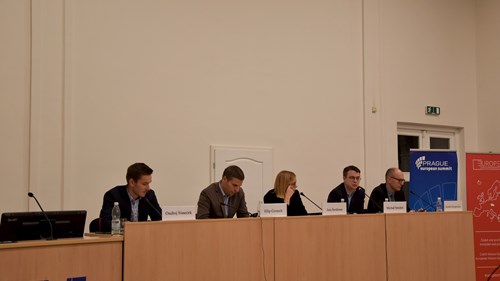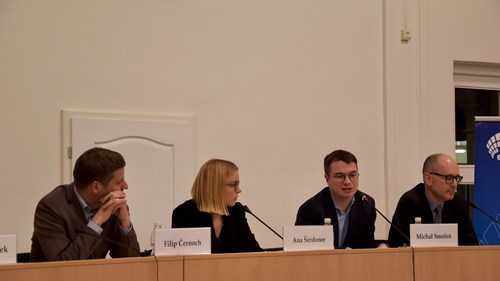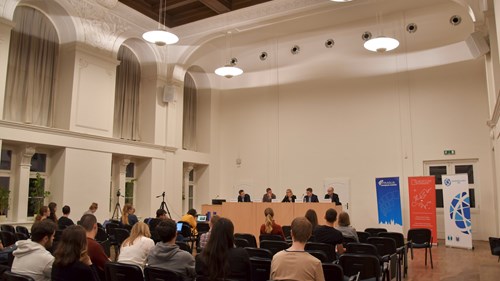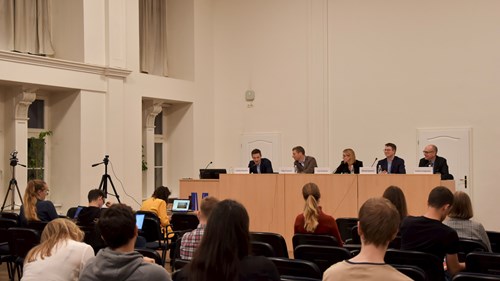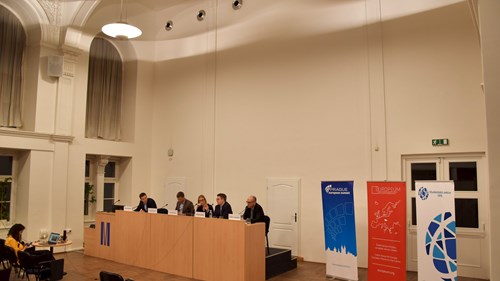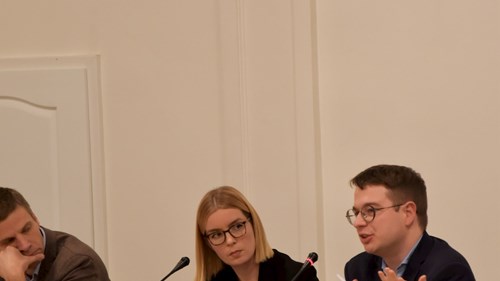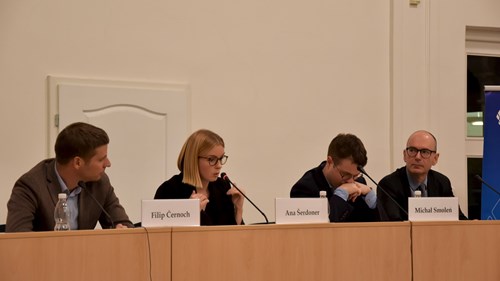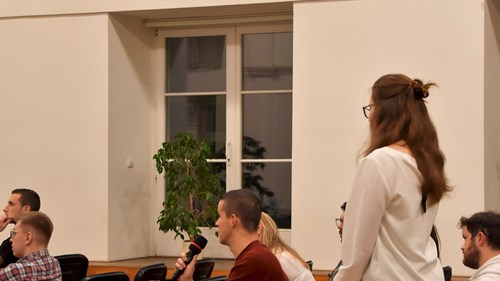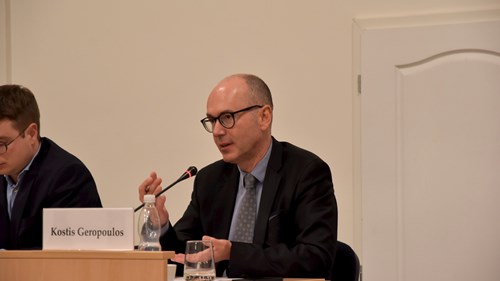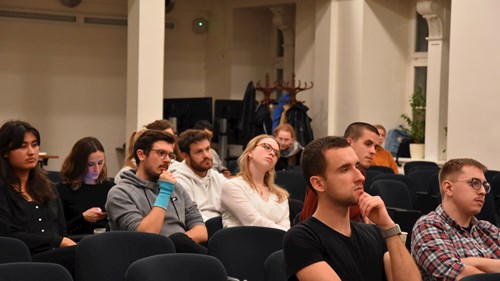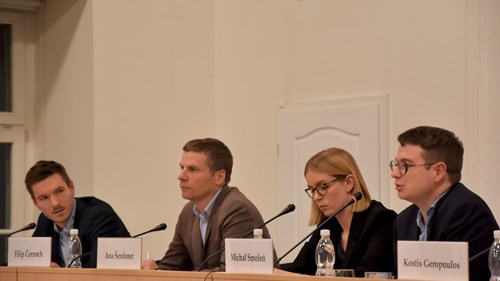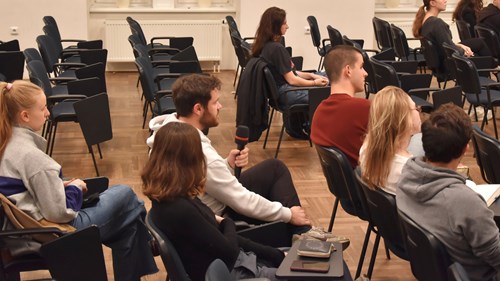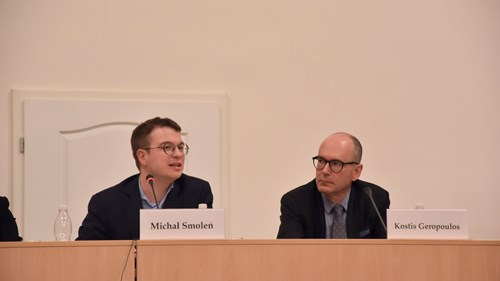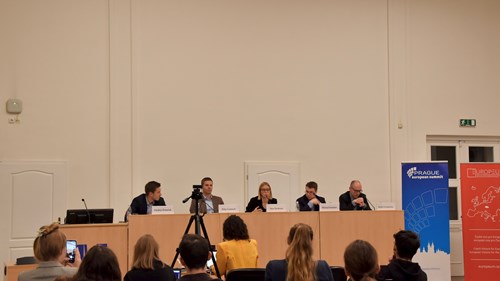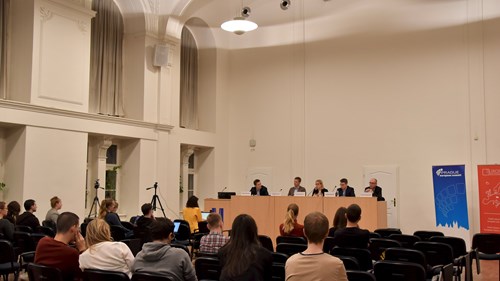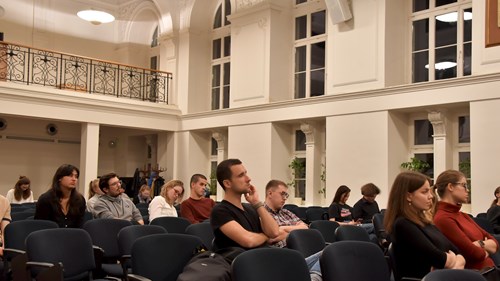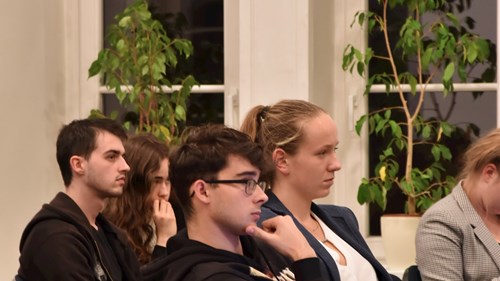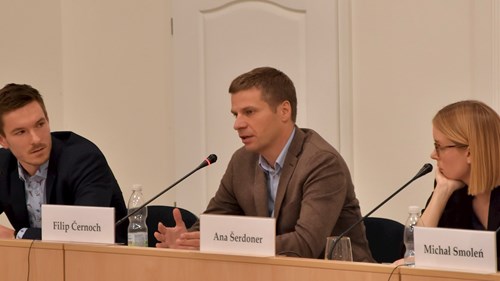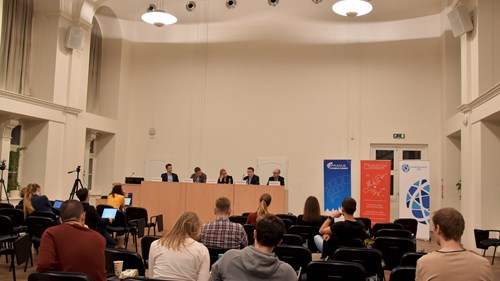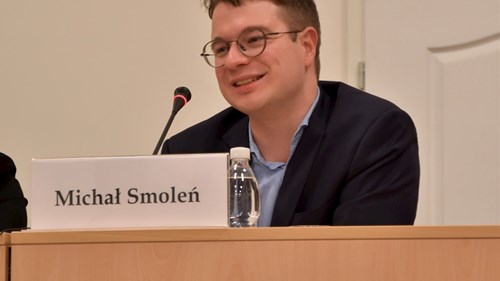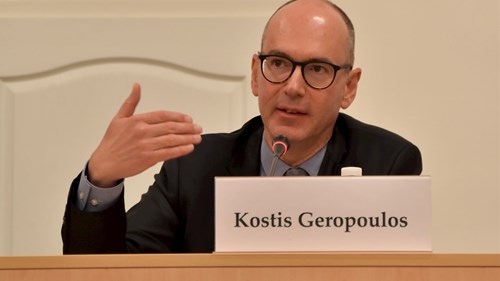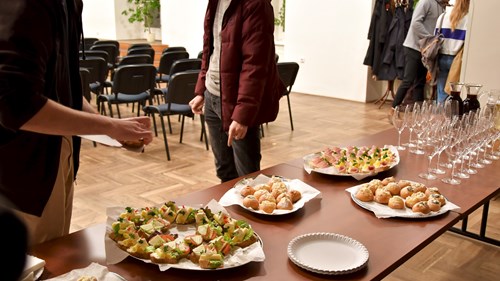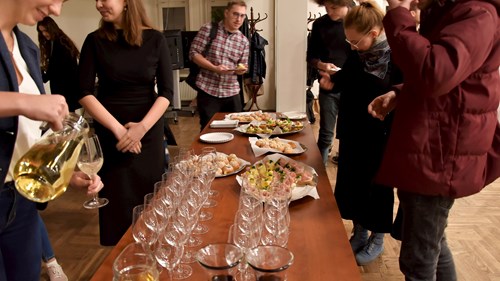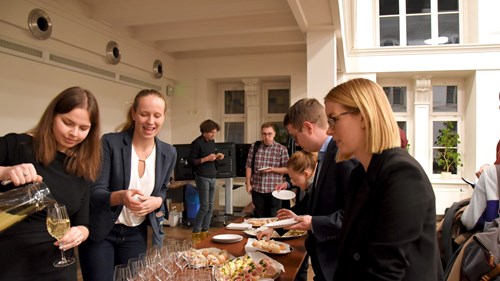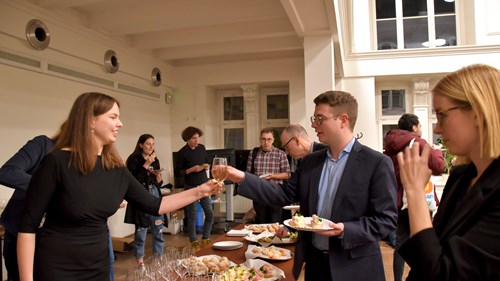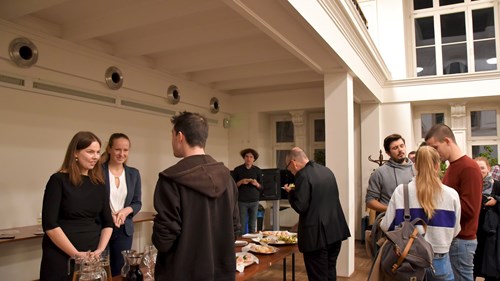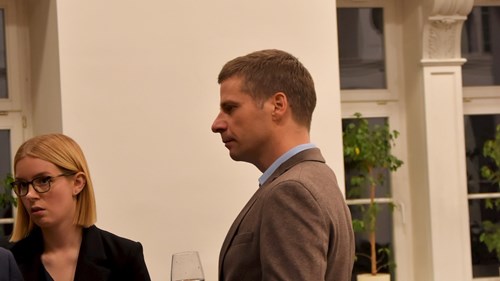Dne 9. listopadu 2022 se na půdě Fakulty sociálních studií Masarykovy univerzity uskutečnila debata ze série Urban Talks s názvem „Gaslighting future generations". Diskuzi Studentská sekce IIPS organizovala ve spolupráci s Prague European Summit. Této debaty se zúčastnil docent z Katedry mezinárodních vztahů a evropských studií MU Filip Černoch, vedoucí politický manažer pro průmysl a energetický systém v Belloně Ana Šerdoner, vedoucí programu pro energetiku v nadaci Instrat Michał Smoleń, a Kostis Geropulos, ředitel pro energetiku a klimatickou politiku a bezpečnost v NE Global. Debatou celý večer provázel moderátor a editor České televize Ondřej Šimeček.
Debatu uvedl Ondřej Šimeček, který nejprve představil hosty. Diskuze začala otázkou, v jaké situaci se svět ocitl po ruské invazi Ukrajiny. Ana Šerdoner v tomto kontextu zdůraznila důležitost šetření energií. Filip Černoch na druhou stranu poukázal na fakt, že při zastropování cen musíme postupovat opatrně, neboť přílišné zastropování může vést k naopak nárůstu spotřeby. Moderátor na tato tvrzení okamžitě reagoval otázkou, jakými způsoby můžeme změnit naše dosavadní návyky spotřeby energií. Michał Smoleń rozebral složitost této otázky. Konstatoval, že největším spotřebitelem energií je průmysl, ale zároveň podotkl, že situace je složitější, než si mnohé vlády uvědomují. Uvedl příklad balení potravin, na které je často potřeba oxid uhličitý, který vzniká jako vedlejší product při průmyslové výrobě, kde se používá plyn, a po odstavení průmyslu by ho byl nedostatek.
Poté se diskuze stočila k vymyšlení řešení, jak se energeticky zabezpečit v blízké budoucnosti. Kostis Geropoulos hovořil o zrychlení rozvoje „zeleného plynu“ a vodíku, ale nakonec konstatoval, že v současnosti je důležitější naplnit potřeby lidí namísto klimatu, vzhledem na vysoké účty, které lidé momentálně dostávají. Filip Černoch pana Geropoulusa doplnil rozebráním současné situace, kde není jednoduché najít náhrady energií a vyzdvihl významnost zničení potrubí Nord Stream z historického hlediska. Taktéž se vyjádřil, že podle něj bude nejtěžším obdobím až budoucí zima.
Posléze jsme se přesunuli do druhé části debaty, kdy přišel čas na otázky z publika Diváci byli velmi aktivní, a zajímali se o nové a alternativní energetické zdroje. Rozebírala se otázka jaderných elektráren, kde i diskutující měli rozdílné názory. Shodli se na účinnosti i komplikacích jaderných elektráren, které vznikají, ale uměli se shodnout, zda náklady a rizika převažují benefity. Ana Šerdoner také upozornila na náklady při rozebrání atomových elektráren na konci jejich životního cyklu. Filip Černoch byl zase poněkud kritický k německému rozhodnutí odstavit funkční jaderné elektrárny. Otázky se točily i kolem vodíku, ten sice má podle diskutujících budoucnost jako palivo pro vlaky nebo lodě, ale nenahradí plyn v jeho funkčnosti. Jeden z diváků se také zajímal, proč se více nevyužívá biomasa. Michał Smoleń vysvětlil problémy biomasy hlavně omezeným objemem odpadu, který můžeme využít. Závěrečná otázka se týkala problémů obnovitelných energií a jejich nestálosti. Diskutující nakonec zhodnotili, že tyto problémy se nejlépe vyřeší lepšími technologiemi a diverzifikací.
Na závěr diskuse moderátor Ondřej Šimeček poděkoval diskutujícím, že si udělali čas prezentovat své názory na půdě Masarykovy univerzity, a také divákům za jejich zajímavé postřehy a otázky. Po ukončení debaty měli naši diváci příležitost si ještě osobně popovídat a poděkovat našim diskutujícím a občerstvit ve studeném bufetu. Na závěr ještě jednou chceme jménem celé SSIIPS poděkovat diskutujícím za jejich čas a věříme, že diskutující navštíví naši univerzitu i příště.
On 9 November 2022, a debate from the Urban Talk series entitled "Gaslighting future generations" took place at the Faculty of Social Studies of Masaryk University. The debate was organized by the IIPS Student Section in cooperation with the Prague European Summit. The debate was attended by Filip Černoch, Associate Professor at the Department of International Relations and European Studies at MU, Ana Šerdoner, Senior Policy Manager for Industry and Energy System at Bellona, Michał Smoleń, Head of the Energy Programme at Instrat Foundation, and Kostis Geropulos, Director for Energy and Climate Policy and Security at NE Global. Ondřej Šimeček, moderator and editor of Česká televize, moderated the debate throughout the evening.
The debate was introduced by Ondřej Šimeček, who first introduced the guests. The discussion started with the question of the situation the world finds itself in after the Russian invasion of Ukraine. In this context, Ana Šerdoner stressed the importance of energy conservation. Filip Černoch, on the other hand, pointed out that we must be careful when capping prices, as over-capping can lead to a rise in consumption. The moderator immediately responded to these statements by asking how we can change our current energy consumption habits. Michał Smoleń discussed the complexity of this issue. He noted that industry is the largest energy consumer, but also pointed out that the situation is more complex than many governments realize. He cited the example of food packaging, which often requires carbon dioxide, which is a by-product of industrial production where gas is used and would be in short supply when the industry shuts down.
The discussion then turned to devising solutions to energy security in the near future. Kostis Geropoulos talked about accelerating the development of "green gas" and hydrogen, but in the end stated that it is more important to meet people's needs instead of the climate's at the moment, given the high bills people are currently receiving. Filip Černoch complemented Mr Geropoulus by discussing the current situation where it is not easy to find energy substitutes and highlighted the importance of the destruction of the Nord Stream pipeline from a historical perspective. He also said that he believed that the most difficult period would be next winter.
We then moved into the second part of the debate, when it was time for questions from the audience The audience was very active and interested in new and alternative energy sources. The issue of nuclear power plants was discussed, where even the debaters had different opinions. They agreed on the efficiency and complications of nuclear power plants that are being built but were able to agree on whether the costs and risks outweighed the benefits. Ana Sherdoner also pointed out the costs of dismantling nuclear power plants at the end of their life cycle. Filip Cernoch, on the other hand, was somewhat critical of the German decision to shut down operating nuclear power plants. Questions also revolved around hydrogen, which, according to the panelists, has a future as a fuel for trains or ships, but will not replace gas in its functionality. One audience member also wondered why biomass was not being used more. Michał Smoleń explained the problems of biomass mainly by the limited volume of waste we can use. The final question was about the problems of renewable energies and their volatility. In the end, the discussants assessed that these problems are best solved by better technologies and diversification.
At the end of the discussion, Ondřej Šimeček thanked the discussants for taking the time to present their views at Masaryk University and the audience for their interesting insights and questions. After the end of the debate, our audience had the opportunity to have a personal chat and thank our debaters, and have refreshments in the cold buffet. Finally, on behalf of the entire SSIIPS, we would like to thank the debaters for their time once again.
Autor: Matej Bazovsky
Fotografie: Nikoleta Logginidu


